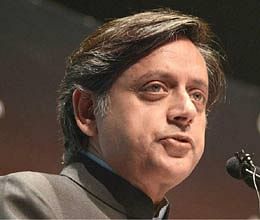
Education in India has made monumental progress since Independence, but continues to face daunting challenges at multiple levels particularly in terms of quality, infrastructure and dropout rates, said Minister of State for Human Resource Development Shashi Tharoor.
Tharoor was speaking at an interaction with a group of students and faculty members from US's Kansas University (KU) in the state on an 18-day visit as part of their exchange programme with the Asian School of Business (ASB) here.
"We have islands of excellence floating in a sea of mediocrity. And institutions here do not adequately prepare students for the jobs market which is why many industries often have to spend time and effort on supplementary training for people they recruit," he said.
"I'm not a techno-determinist. I believe we need to improve our existing human resources and technology can only be a complement," he added.
Tharoor said Kerala has rates comparable to the US in terms of literacy, life expectancy, healthcare indicators, higher education and female empowerment, all of which it has achieved despite having just one-70th of the US's per capita income.
On brain drain, he said the trend was now reversing with many Indians educated abroad coming back to work in their home country.
"There was a time when bright people had few prospects for higher education and good jobs here. But that is changing. India is no longer seen as an undesirable place to work or pursue research," he said.
The team, led by Prof Kissan Joseph from the KU School of Business and Prof Michael Detamore from the Kansas University School of Engineering, has visited several establishments in the state capital.
This is the fifth group of Kansas University students to visit Kerala under the exchange programme with ASB.
Tharoor was speaking at an interaction with a group of students and faculty members from US's Kansas University (KU) in the state on an 18-day visit as part of their exchange programme with the Asian School of Business (ASB) here.
"We have islands of excellence floating in a sea of mediocrity. And institutions here do not adequately prepare students for the jobs market which is why many industries often have to spend time and effort on supplementary training for people they recruit," he said.
"I'm not a techno-determinist. I believe we need to improve our existing human resources and technology can only be a complement," he added.
Tharoor said Kerala has rates comparable to the US in terms of literacy, life expectancy, healthcare indicators, higher education and female empowerment, all of which it has achieved despite having just one-70th of the US's per capita income.
On brain drain, he said the trend was now reversing with many Indians educated abroad coming back to work in their home country.
"There was a time when bright people had few prospects for higher education and good jobs here. But that is changing. India is no longer seen as an undesirable place to work or pursue research," he said.
The team, led by Prof Kissan Joseph from the KU School of Business and Prof Michael Detamore from the Kansas University School of Engineering, has visited several establishments in the state capital.
This is the fifth group of Kansas University students to visit Kerala under the exchange programme with ASB.










